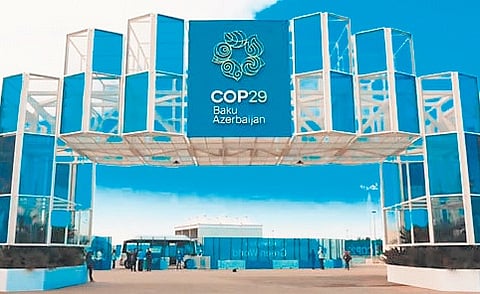

BAKU: The climate finance talks at COP29 are going on at a snail's pace with no significant headway achieved although five days have passed.
Yalchin Rafiyev, COP29 lead negotiator, during the presidential press conference on Friday called upon the parties to use the precious time wisely. "...talk to each other and take ownership of building bridging solutions. We must be honest. We believe that the pace of their work is currently too slow. We cannot afford to leave too much work to be covered later in the summit at the political level. We are urging everyone to intensify their engagements and remain focused on the imperative to make quick progress," he said.
Meanwhile, at the high-level ministerial, India on behalf of the Like-Minded Developing Countries (LMDCs) made a statement reiterating its demand from the developed countries for $1.3 trillion annually until 2030. “We are at a crucial juncture in our fight against climate change. What we decide here will enable all of us, particularly those in the Global South, to not only take ambitious mitigation action but also adapt to climate change. This COP is historic in this context,” said Naresh Pal Gangwar, India's lead negotiator at CoP29. He added that the principles of equity and common but differentiated responsibilities must be the basis for a strong outcome on the New Collective Quantified Goal (NCQG).
The statement reiterated that developed countries need to commit to provide finance through grants, concessional finance and non-debt-inducing support that cater to the evolving needs and priorities of developing countries without subjecting them to growth-inhibiting conditionalities.
India also strongly laid down the point that bringing in the elements of any new goal that are outside the mandate of the convention and its Paris Agreement is unacceptable. The statement ruled out any scope for re-negotiation of the Paris Agreement and its provisions.
By the end of the day, another draft text on NCQG was released by co-chairs with little change compared to the previous version. From 34 pages, the text document was reduced to 25 pages removing some of the repetitions and options. Different blocs continue to have divergent views on all the key elements.
Meanwhile, representatives of the Alliance of Small Island States (AOSIS) and Least Developing Countries asked parties to respect the COP process and deliver. Michai Robertson, the AOSIS climate finance negotiator, said: "It's extremely important for forums like the UNFCCC to continue to exist and continue to be legitimate. We have the G20 on one corner and the BRICs on another corner and we are seeing people going to these other corners as opposed to the legitimate corners where all of us can be around the table. While others may have the criticism of the COP process it is extremely important for us because that is the only time our voice can be clearly heard."
Just like COP28 held in Dubai, COP29 also is witnessing a significant participation of fossil fuel company executives. An open letter was written by advocacy groups to the UNFCCC secretariat seeking an overhaul of the COP process. About 132 fossil fuel company executives are present at COP29 on Azerbaijan Presidency Badges.